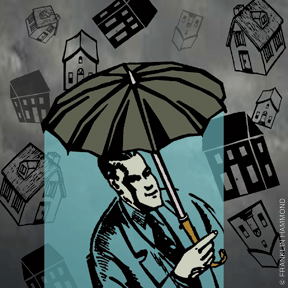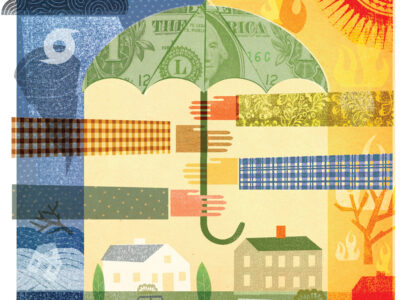What’s the best way to solve the mortgage crisis?

It’s hard to say who had it worse in 2007: mortgage lenders or American homeowners. Foreclosure filings topped 2 million and more than 400,000 families lost their homes. But those might seem like the good old days by the time 2008 has run its course. Defaults have continued to soar, and the collapsing market for mortgage-backed securities has crippled once-mighty investment banks. As a brutal first quarter came to a close, Gazette associate editor Trey Popp talked with David Skeel, the S. Samuel Arscht Professor of Corporate Law, about what should be done to address the problem. He tackles these issues as well as Christian perspectives on law in Less Than The Least a blog he runs with fellow evangelical Protestant William Stuntz of Harvard Law School.
The Mortgage Bankers Association reported that late payments and defaults on home mortgages reached record highs at the end of last year. Many experts fear that the peak in delinquencies and foreclosures is yet to come. How did we find ourselves in this situation?
The crisis has many causes, but at the base of it was a perception that housing prices were going to keep going up forever. So no matter how onerous the terms of your mortgage might seem to be, or how optimistic the assumptions about how much your house needed to be worth for you to support the mortgage, there were people who were anxious to borrow.
Is this a simple issue of borrowers acting irresponsibly?
No, I really don’t think it is. Many borrowers were acting irresponsibly, but it was not just a borrower phenomenon. I think the market was driving this in many ways. When banks learned that they could make a mortgage and then sell it off and get the money for it immediately—and go make another mortgage and once again get the money immediately—it changed the way they thought about lending. And with all of the new financial instruments people have developed, mortgage terms that would have seemed crazy 20 years ago—things like an adjustable-rate mortgage where you don’t necessarily have to pay the interest; it’s just rolled back into and increases the loan—those just seemed like normal financial instruments. When you put these developments on the lender side into the mix, it’s not just the borrowers who were acting irresponsibly. In my view, there’s plenty of blame to go around.
What exactly are securitized mortgages?
They take lots of different forms, but here’s a simplified version. In a traditional mortgage, the lender lends money to a homeowner so the homeowner can buy a house, and the homeowner signs a promise to repay, supporting that promise with a mortgage on her house. What has happened in the last 10 or 20 years is that rather than the bank holding that mortgage and collecting the payments, they have sold the mortgage—often to an investment banker who assembles a large number of mortgages and sells interests in them to investors in the marketplace. The mortgages that are bundled together like this are described as having been “securitized.” One of the big concerns is that if the bank has no responsibility for what happens with that mortgage after the bank sells it, the bank’s not really going to think very hard about whether this is a good loan or a bad loan.
Is there any evidence suggesting that securitized mortgages fail at a greater rate?
There’s a new study by an economist at the University of London and two co-authors that looks at the comparison between mortgages that get securitized and mortgages that don’t. They found that the ones that were securitized were 20 percent more likely to default, which strongly suggests that part of the problem is the securitization of mortgages.
Have any of the presidential candidates proposed a solution to the mortgage crisis that has merit?
Hillary Clinton has essentially proposed what looks to me like a very large bailout to pay for these mortgages, which I think is a terrible idea. A big problem with bailouts is that they don’t punish the lender for making bad loans. McCain has gone in exactly the opposite direction. He is so far suggesting that we really shouldn’t do all that much—that we should allow the market to work itself out, that people who made bad decisions ought to be punished for making bad decisions. Obama’s approach also seems to be mostly a bailout approach, somewhat like Hillary Clinton’s.
What kind of solution would you support?
The proposal that I personally feel does the best job is one by Senator Richard Durbin that would allow homeowners to file for bankruptcy to reduce their mortgage to the current value of their house. So if the mortgage is now much bigger than the value of the house, the mortgage could be lowered to the value of the house, and the interest rate could be altered in bankruptcy as well. The advantage of that is it helps a lot of people who might otherwise lose their home—but everybody faces consequences for having borrowed or lent too much. The lenders are punished because they end up with a different loan than the one they started with. The homeowners are punished because you have to file for bankruptcy to get this protection, and bankruptcy is not something most people want on their resume. Both Clinton and Obama have suggested they support this proposal, but neither has promoted it very actively, especially recently.
Does it stand a chance politically?
At this particular moment, it has zero chance. President Bush has explicitly said he has no interest in changing the bankruptcy laws in anything like this fashion. In 2009, when we have a new president, would this proposal have a chance? I think it’s more likely to have a chance if the Democratic nominee wins, and we are still in the financial trouble we’re in. If McCain wins, or if the financial trouble seems to abate, I suspect the chances will remain small.
What’s the downside of adjusting the law?
There are two main complaints. One is that we’re interfering with the sanctity of contracts, as people in my business like to say. We’d be letting bankruptcy judges rewrite contracts, and there is a view that contracts ought not be rewritten. But it should be said that we do that all the time in bankruptcy, and contracts involving most other assets can be altered in bankruptcy. The other, more politically serious concern is that this sort of provision will cause lenders to react in a way that will make future loans for homeowners more costly. The idea is that if a bank faces the possibility of having its mortgage altered in bankruptcy, that’s a new risk for the bank, and it’s going to raise the interest rates on future borrowers.
My own view is that that risk is vastly overstated. It’s not likely that mortgage rates would be affected dramatically at all by this kind of a change. I think one useful analogy is the complaint you get from Detroit when people say we ought to have seatbelts in cars, or cars ought to get better gas mileage. The automakers say that the world’s going to end and the sky’s going to fall if you do these things. But what we tend to see is that the market adjusts. There may be a slightly higher cost to the cars, but in each of these circumstances we’ve concluded that it’s a price well worth paying. I think you can make exactly the same argument with respect to this bankruptcy proposal. Maybe in some small way mortgage rates will change—although there’s not much evidence that they will—but even if they do change a little bit, surely it’s worth this slight premium if the effect is to make lenders be a little bit more careful going forward, and to enable borrowers to renegotiate their loans if there’s a problem like the one we’re facing now.




